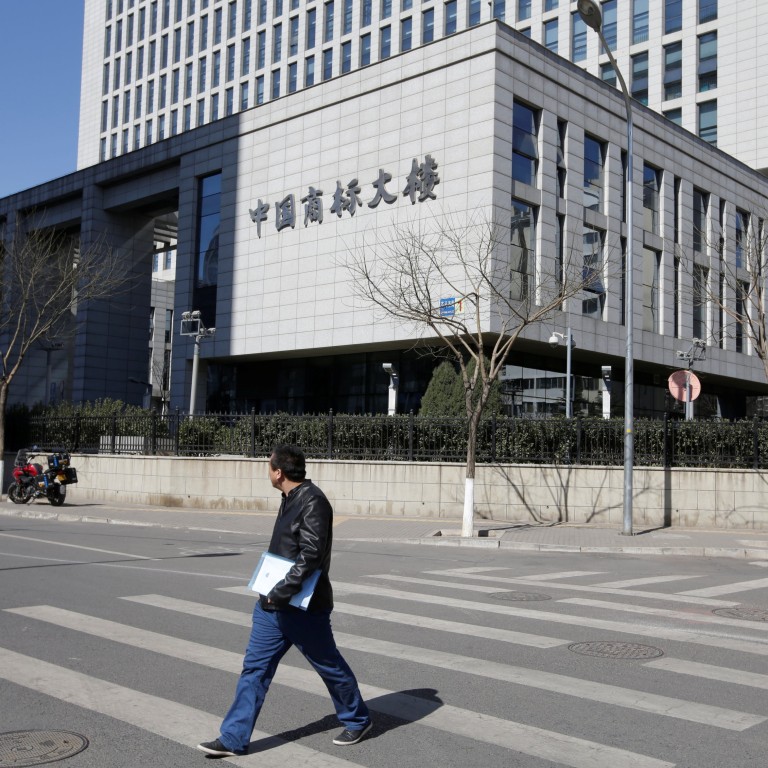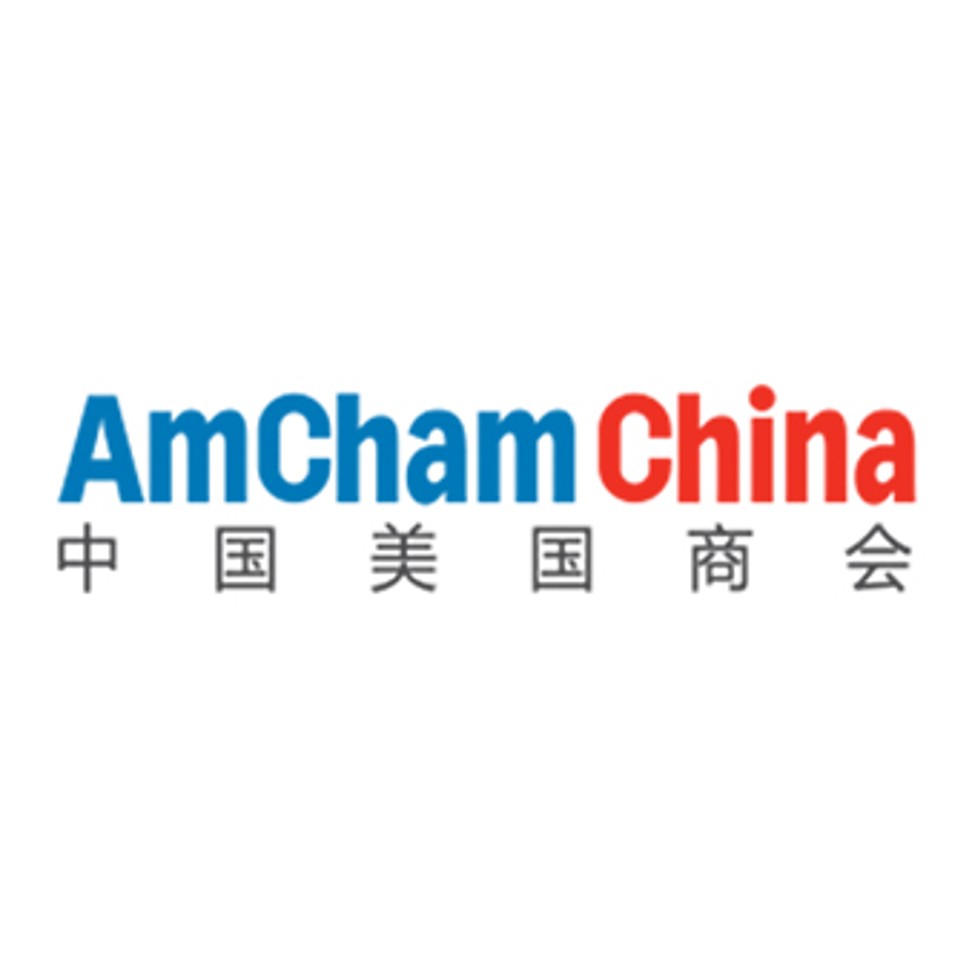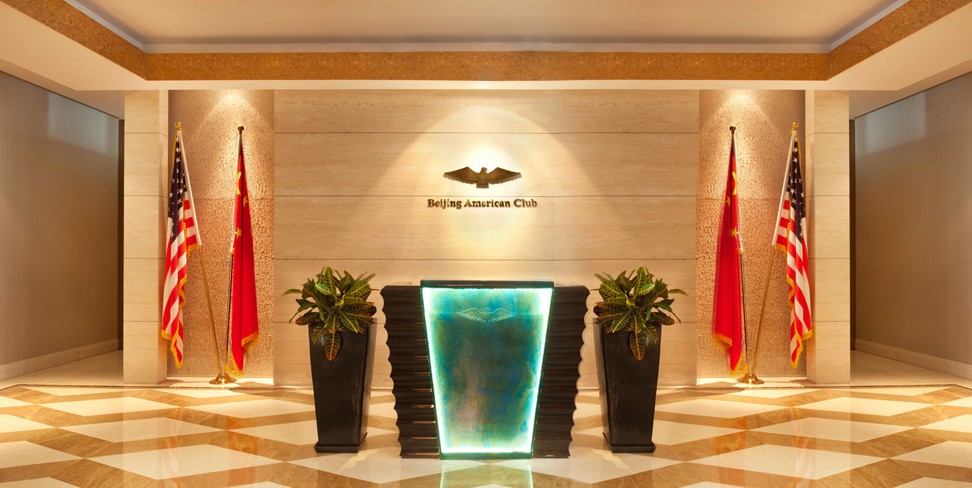
China’s ‘AmCham’ trademark case sheds light on Beijing’s intellectual property protection progress
- US lawyer Edward Lehman sued the American Chamber of Commerce in China in an attempt to regain control of trademarks he first registered in 1998
- Since Donald Trump took office as president of the United States, the issue of intellectual property theft has played a major role in the ongoing trade war
Edward Lehman never thought that the three registrations he made with China’s Trademark Office for US$300 in 1998 could ever get lost, nor could he imagine he would then be embroiled in a decade-long legal dispute to win them back.
When the US-born lawyer followed the steps of tens of thousands of American businessman who came to China in the 1980s, intellectual property was only a vague concept unfamiliar to the vast majority of Chinese businessmen and officials.
Pirated movies and music were easily available on street corners and small shops in every major city in China, while unauthorised versions of Microsoft’s Windows operating system continue to be used on the computers of Chinese families in early years of the new millennium.
Better intellectual property protection for firms from the United States doing business in China has been a key issue in bilateral trade negotiations ever since Bill Clinton was president, and the issue is now at the centre of American demands to end the current trade war.

But this time, what is different about Lehman’s dispute is that it is with another American institution in China. Lehman is suing the American Chamber of Commerce in China, one of the main lobbying groups for American companies. He claims they stole three “AmCham” trademarks he first registered in the name of the American Club of Beijing, a non-profit organisation incorporated in Pennsylvania. The American Chamber of Commerce in China disputes Lehman’s claim.
Lehman said the American Chamber of Commerce in China was willing to negotiate a deal to transfer the trademarks in 2009, but a lawyer representing the lobbying group also approached Carole E. Bowers, who owned the American Club, registered in Pennsylvania as a sole proprietorship, and signed a document transferring the trademarks she technically did not own.
The American Chamber of Commerce in China used that document to apply for a transfer of the trademarks in China, with the transfer officially approved in March 2010 because of a loophole in the registration system, Lehman said. The original applicant was the “American Club” with an address in the city of Chicago, and the government agency did not require proof of trademark ownership at the time of the transfer, allowing the American Chamber of Commerce in China to obtain the trademarks.
“The irony is that the chamber itself, which accuses China of stealing intellectual property, is a Chinese organisation under Chinese law that has stolen American-owned intellectual property,” Lehman said in his office in the Liangmaqiao neighbourhood of Beijing, only a few hundred metres from the US embassy complex. “The truth is the truth, the theft is the theft.”
The irony is that the chamber itself, which accuses China of stealing intellectual property, is a Chinese organisation under Chinese law that has stolen American-owned intellectual property
The American Chamber of Commerce in China is a Chinese-registered entity that represents more than 700 American businesses including the likes of Boeing and Microsoft, and has constantly called for greater access and a level playing field for US companies doing business in China.
William Rosoff, the general counsel for the American Chamber of Commerce in China, denies that Lehman ever owned the trademarks.
“He registered it with the name of the American Club, but he didn’t own the American Club. When you register a name that is not yours, that has consequences,” he said.
“The real issue is who is the proper owner of those trademarks, AmCham the entity, or some [intellectual property] lawyer who decided on his own to register these marks that don’t belong to him.”

Records at the Chinese Trademark Office of the National Intellectual Property Administration indicate there are 67 “AmCham” trademark records scattered throughout its system, with the three earliest filed by Lehman, now registered to the American Chamber of Commerce in China.
There are also dozens of applications for the American Club of Beijing made in 2009, when the dispute between the two sides began, labelled “void” as a result of the opposition by the lobbying group.
The ongoing 10-year feud reflects the complexity of intellectual property protection in general, and also the evolution of the Chinese system to protect rights over the last decade.
After he lost control of the trademarks in April 2010, Lehman’s first move was to file a lawsuit against Bowers, who signed the deal transferring the trademarks to the American Chamber of Commerce in China, in Lancaster County, Pennsylvania.
According to a photocopied document provided by Lehman dated September 2011, the local court ruled that “Bowers is hereby permanently enjoined and restrained from .... representing that she, or her registered fictitious name ‘American Club’, or any entity owned or controlled by her ever applied for or was awarded the ‘AmCham’ registered trademarks numbered 1309818, 1315487 and 1319892”.
The US court’s verdict was submitted to the Chinese courts as evidence, according to the China Judgements Online website.
He registered it with the name of the American Club, but he didn’t own the American Club. When you register a name that is not yours, that has consequences
Soon after, Lehman filed an administrative review with China’s Trademark Office, demanding that the transfer American Chamber of Commerce in China be revoked. After his plea was rejected, he appealed to the trademark review and adjudication board of the State Administration of Industry and Commerce, before lodging a series of administrative lawsuits against the trademark office all the way to the Beijing First Intermediate People’s Court, the Beijing High Court. He also applied to the Beijing People’s Procuratorate, the prosecutor’s office, for supervision.
The litigation went on until the Chaoyang District People’s Court in Beijing made a civil judgment on December 20, 2018, ruling that the “civil act of transferring registered trademarks No. 1309818, No. 1319892 and No. 1315487 by the Defendant Carole E. Bowers to the Defendant the American Chamber of Commerce in PRC is hereby determined as void”.
But it also called for the two parties to solve their dispute between themselves, as “the subsequent treatment involves administrative organs”. The court, in this case, could not order the American Chamber of Commerce in China to transfer the trademarks back to the American Club, meaning the two parties must seek alternative resolution.
Rosoff confirmed that the American Chamber of Commerce in China has appealed to the Beijing Intellectual Property Court, and stresses they will fight as long as necessary to retain control of the trademarks.
“Even if the registration was done by him, it’s [an] invalid registration … because he’s not the AmCham. He’s just some guy making profits by registering these [trademarks] when he was on the board [of the American Chamber of Commerce in China],” Rosoff said, who confirmed Lehman was a member of the American Chamber of Commerce in China board in the late 1990s.

But the fact that Lehman was able to obtain a hearing in a Chinese courts against a well-connected institution suggests improvements in China’s intellectual property protection process. The American Club in Beijing have also lodged a damages lawsuit in Pennsylvania against the American Chamber of Commerce in China, according to Lehman.
This was just one of more than 300,000 intellectual property cases that Chinese courts at different levels handles each year, a number Beijing often cites to prove its improvement in intellectual property protection, but a meaningless number in the eyes of officials in Washington.
Since Donald Trump was sworn in as president in January 2017, theft of trade secrets and forced technology transfer have risen rapidly up the trade policy agenda.
“We cannot allow this to happen as it has for many years!” he tweeted in March 2018, before the release of a report under Section 301 of US trade law that triggered the trade war with China.
In the report, the Office of the US Trade Representative (USTR) portrayed China as a systematic intellectual property thief through foreign ownership restrictions, overseas acquisitions and cyber-enabled economic espionage that led to trillions of dollars of losses for American businesses.
“China fundamentally has not altered its acts, policies, and practises related to technology transfer, intellectual property, and innovation, and indeed appears to have taken further unreasonable actions in recent months,” according to the USTR in December.

Beijing insists that it has taken extensive efforts to address overseas concerns by cracking down on infringements, aiming to strengthen protection for the sake of its own innovation-based development.
The country established specialised intellectual property courts in the largest cities of Beijing, Shanghai, and Guangzhou in 2014, and the Supreme High Court started a specialised court in 2019 to hear technically complicated cases.
China’s legislature also passed a new foreign investment law in March which contained special clauses forbidding forced technology transfer and enhancing intellectual property protection.
“China still needs to catch up in some areas of legislation and enforcement, but overall it’s moving in the direction of improvement,” said Wu Qi, a senior fellow of the Beijing-based think tank, the Pangoal Institution.
“Regardless of US pressure, which may be just a negotiation tactic to maximise its claims, intellectual property protection is a must for domestic innovation. Otherwise, how could any Chinese enterprise be willing to spend on research and development.”
Regardless of US pressure, which may be just a negotiation tactic to maximise its claims, intellectual property protection is a must for domestic innovation
However, a growing number of Beijing policy advisers have expressed concerns that the issue will continue to complicate negotiations with the US, making its difficult to reach a conclusion in a short period of time.
Chen Fengying, a senior researcher with the China Institutes of Contemporary International Relations, argued said the current dispute over intellectual property protection is totally different from what was discussed one or two decades ago, and is part of broader US efforts to contain China’s technological progress.
“Now it’s an issue that [the US] won’t allow you to solve. It’s a matter of technology competition,” Chen said. “They won’t be satisfied with whatever you do.”
Regardless of how the issue plays out in trade war negotiations, Lehman expressed confidence in China’s progress on protecting intellectual property after working in the country for more than two decades.
“China is fixing its intellectual property [issues], not for foreigners, but for themselves,” he said.

